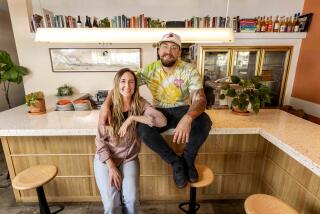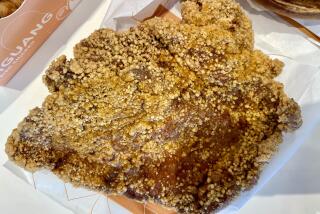Banker Turns Baker and Pulls Out a Plum--and Plump--Chicken Pie Business
- Share via
ANAHEIM — Jay E. Candelaria thought he had a great idea four years ago. Having been told that hamburgers and french fries were very popular with Asian diners, he figured that another American culinary standard--the chicken pot pie--might also fare well.
But when the Fullerton banker began looking for a company to manufacture chicken pies for export to Asia, he learned that most were already having trouble meeting chicken pie orders for restaurants and food distributors. Chicken pies, he was surprised to find out, are still very much a hot item among U.S. consumers.
So he changed his plan. Instead of exporting pies, he would sell them in this country. But not just any pie.
The biggest demand, food industry officials told him, was for high-quality chicken pies with no preservatives or other additives--like the kind Mom used to make. “I wanted a healthy, natural chicken pie that even a baby can eat,” he said.
His idea has proven to be a good one. Sales in 1991, the first year of business for his company, Arista Foods Corp., exceeded $400,000. And despite the recession, sales continue to climb. He projects sales of about $1 million this year.
Chicken pies are a long way from Candelaria’s past pursuits. For 33 years, he worked for a small Los Angeles bank before retiring in 1987 as its president. In addition, he comes from a long line of ministers and teachers, whose ancestors were among the first Spanish settlers in what would become New Mexico.
Candelaria, who worked for a small Los Angeles bank for 33 years before retiring in 1987 as its president, got some financial backing from friends to start his pie company. He assembled a team of chefs and production workers familiar with the commercial food business. His chef is Frank Gurule, who once operated his own chicken pie company in Long Beach and owned several restaurants in Southern California. Gurule brought in his younger brother, George, as his production manager.
From talking to industry experts, Candelaria found that a common complaint is that most pie companies cut the chicken too small, making the pieces too difficult to find amid the gravy and vegetables. He was also told that thinner crusts are easier to bake.
Candelaria passed those ideas on to his chefs, who came up with a thin-crusted, nine-ounce pie filled with large chunks of chicken and vegetables.
His biggest challenge was finding a baking facility. After a three-month search, he found an Anaheim plant owned by a pie company that had gone out of business a few months earlier.
“Finding it was like stumbling on a gold mine,” he said.
The plant had operated for years as a maker of fruit pies before going out of business. The plant required little renovation.
In April, 1990--nine months after he caught pie fever--Candelaria took over the lease of the plant. The Gurule brothers supervised the plant renovation and refined the recipe, while Candelaria lined up financial support. They hired a Laguna Hills food broker, W.H. Gardner & Associates, to distribute the pies to hospitals, upscale restaurants and hotels--places where a “healthier” pie would be preferred.
In late July, 1990, Arista Foods began producing small quantities of chicken pies as samples for major Southland food distributors. Candelaria calls his product Mrs. Larson’s Chicken Pot Pie. His reason: “It’s a Midwestern name, and the Midwest is known for good home cooking.”
Sales took off last year after Arista snagged several major food distributors and restaurants, including Smart and Final Iris Corp. in Los Angeles and BJ’s Wholesale Club, a Massachusetts-based operator of an East Coast chain of warehouse stores.
Candelaria, who now has 21 employees, said his formula for success is simple. He advises would-be entrepreneurs to “find a product in demand, listen to consumers of that product, then fill that demand with the best product you can produce.”
More to Read
Eat your way across L.A.
Get our weekly Tasting Notes newsletter for reviews, news and more.
You may occasionally receive promotional content from the Los Angeles Times.









